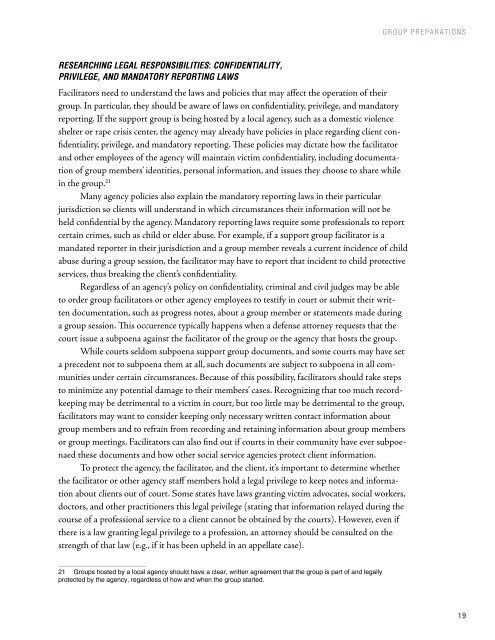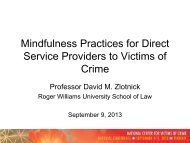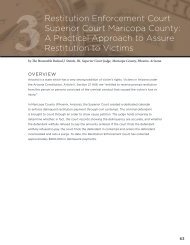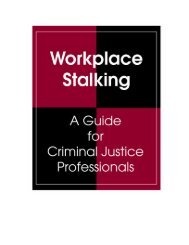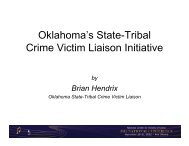How to Start and Facilitate a Support Group for Victims of Stalking
How to Start and Facilitate a Support Group for Victims of Stalking
How to Start and Facilitate a Support Group for Victims of Stalking
- No tags were found...
Create successful ePaper yourself
Turn your PDF publications into a flip-book with our unique Google optimized e-Paper software.
<strong>Group</strong> PreparationsResearching Legal Responsibilities: Confidentiality,Privilege, <strong>and</strong> M<strong>and</strong>a<strong>to</strong>ry Reporting LawsFacilita<strong>to</strong>rs need <strong>to</strong> underst<strong>and</strong> the laws <strong>and</strong> policies that may affect the operation <strong>of</strong> theirgroup. In particular, they should be aware <strong>of</strong> laws on confidentiality, privilege, <strong>and</strong> m<strong>and</strong>a<strong>to</strong>ryreporting. If the support group is being hosted by a local agency, such as a domestic violenceshelter or rape crisis center, the agency may already have policies in place regarding client confidentiality,privilege, <strong>and</strong> m<strong>and</strong>a<strong>to</strong>ry reporting. These policies may dictate how the facilita<strong>to</strong>r<strong>and</strong> other employees <strong>of</strong> the agency will maintain victim confidentiality, including documentation<strong>of</strong> group members’ identities, personal in<strong>for</strong>mation, <strong>and</strong> issues they choose <strong>to</strong> share whilein the group. 21Many agency policies also explain the m<strong>and</strong>a<strong>to</strong>ry reporting laws in their particularjurisdiction so clients will underst<strong>and</strong> in which circumstances their in<strong>for</strong>mation will not beheld confidential by the agency. M<strong>and</strong>a<strong>to</strong>ry reporting laws require some pr<strong>of</strong>essionals <strong>to</strong> reportcertain crimes, such as child or elder abuse. For example, if a support group facilita<strong>to</strong>r is am<strong>and</strong>ated reporter in their jurisdiction <strong>and</strong> a group member reveals a current incidence <strong>of</strong> childabuse during a group session, the facilita<strong>to</strong>r may have <strong>to</strong> report that incident <strong>to</strong> child protectiveservices, thus breaking the client’s confidentiality.Regardless <strong>of</strong> an agency’s policy on confidentiality, criminal <strong>and</strong> civil judges may be able<strong>to</strong> order group facilita<strong>to</strong>rs or other agency employees <strong>to</strong> testify in court or submit their writtendocumentation, such as progress notes, about a group member or statements made duringa group session. This occurrence typically happens when a defense at<strong>to</strong>rney requests that thecourt issue a subpoena against the facilita<strong>to</strong>r <strong>of</strong> the group or the agency that hosts the group.While courts seldom subpoena support group documents, <strong>and</strong> some courts may have seta precedent not <strong>to</strong> subpoena them at all, such documents are subject <strong>to</strong> subpoena in all communitiesunder certain circumstances. Because <strong>of</strong> this possibility, facilita<strong>to</strong>rs should take steps<strong>to</strong> minimize any potential damage <strong>to</strong> their members’ cases. Recognizing that <strong>to</strong>o much recordkeepingmay be detrimental <strong>to</strong> a victim in court, but <strong>to</strong>o little may be detrimental <strong>to</strong> the group,facilita<strong>to</strong>rs may want <strong>to</strong> consider keeping only necessary written contact in<strong>for</strong>mation aboutgroup members <strong>and</strong> <strong>to</strong> refrain from recording <strong>and</strong> retaining in<strong>for</strong>mation about group membersor group meetings. Facilita<strong>to</strong>rs can also find out if courts in their community have ever subpoenaedthese documents <strong>and</strong> how other social service agencies protect client in<strong>for</strong>mation.To protect the agency, the facilita<strong>to</strong>r, <strong>and</strong> the client, it’s important <strong>to</strong> determine whetherthe facilita<strong>to</strong>r or other agency staff members hold a legal privilege <strong>to</strong> keep notes <strong>and</strong> in<strong>for</strong>mationabout clients out <strong>of</strong> court. Some states have laws granting victim advocates, social workers,doc<strong>to</strong>rs, <strong>and</strong> other practitioners this legal privilege (stating that in<strong>for</strong>mation relayed during thecourse <strong>of</strong> a pr<strong>of</strong>essional service <strong>to</strong> a client cannot be obtained by the courts). <strong>How</strong>ever, even ifthere is a law granting legal privilege <strong>to</strong> a pr<strong>of</strong>ession, an at<strong>to</strong>rney should be consulted on thestrength <strong>of</strong> that law (e.g., if it has been upheld in an appellate case).21 <strong>Group</strong>s hosted by a local agency should have a clear, written agreement that the group is part <strong>of</strong> <strong>and</strong> legallyprotected by the agency, regardless <strong>of</strong> how <strong>and</strong> when the group started.19


